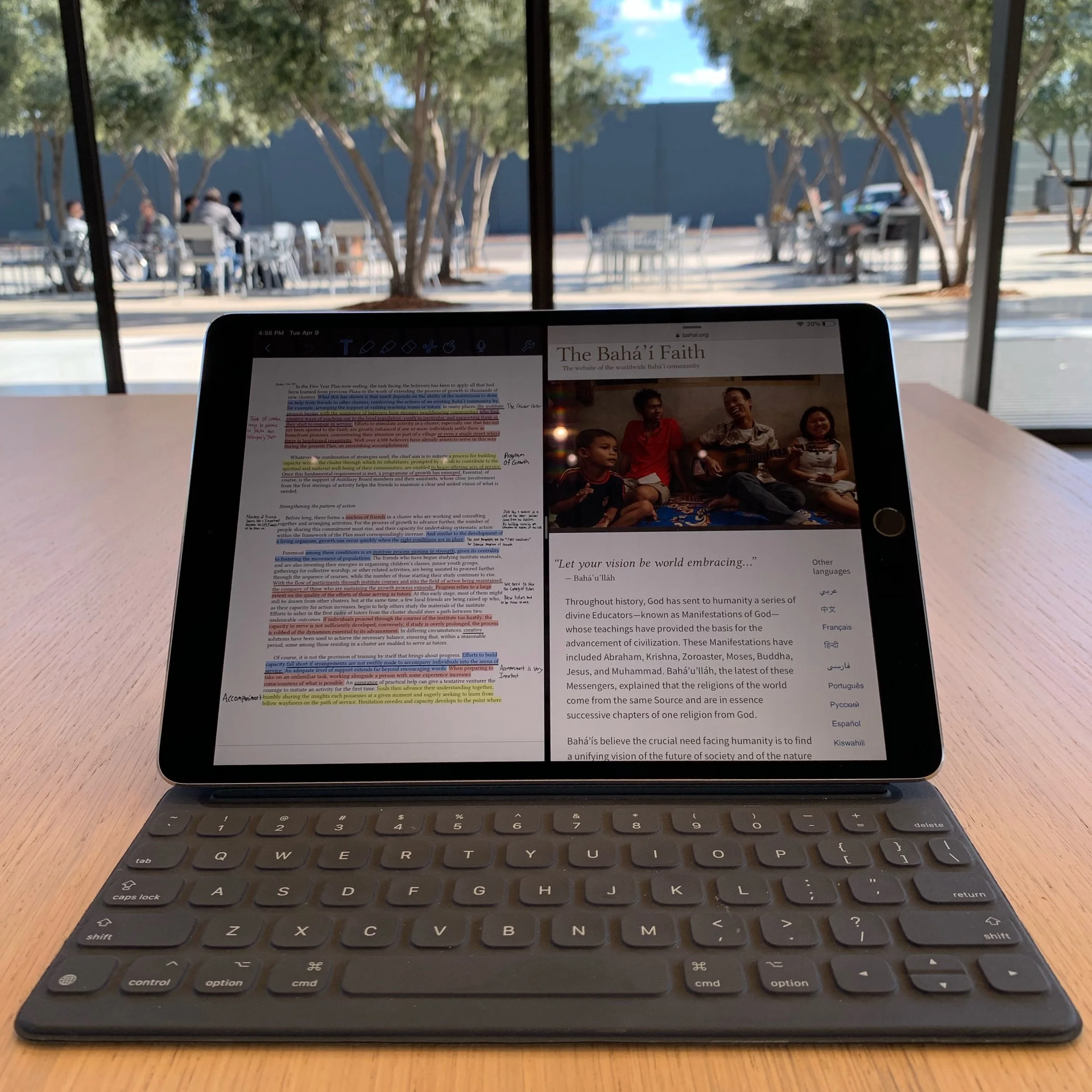How Online Learning will change Education for Everyone
“The primary, the most urgent requirement is the promotion of education. It is inconceivable that any nation should achieve prosperity and success unless this paramount, this fundamental concern is carried forward.” -Secret to a Divine Civilization
To me, this quote from Secret to a Divine Civilization is a reminder of how necessary and important education is to the functioning of not only an individual but of an entire society. Education is imperative to our progress as humans. We should all have access to not only primary school learning (provided to us through the public school system) but also access to quality higher education. Access to Higher Education shouldn’t be a luxury, it should be a right. In our society, we have allowed the name of our university to define us rather than the education itself. Like it or not, where you choose to attend university has affected your image at some point. Growing up, community college was taboo. When people failed exams they would often jokingly reference how they would end up going to our local community college. There was a sort of social currency that was based on which universities you got into and ultimately decided to attend. It was as if your entire worth was based on whether you checked a certain number of seemingly arbitrary and often unknowable boxes. This prestige society places on where Higher Education is cynically underscored by the amount of money spent on a degree, which at the end of the day just represents a golden ticket that allows you to apply to higher paying jobs. Education at its core is about what you learn, not about the name of the institution that facilitates this learning. What’s even worse is that for people that come from low to middle-income families, obtaining this institutional golden ticket can prove much more difficult than it is for families that had the money for SAT Prep, and tutors among other things. The socioeconomic status of a student has a significant impact on their choice of higher education and thus their ability to make money in the future. This current educational system is placing a lock on low to middle-income families that seriously restricts their ability to succeed.
The entire system I just outlined is flawed but where I put the most blame for these flaws are the universities themselves. To take a Calculus I class at NYU without paying for room and board or textbooks costs $6,556 To take a Calculus class at Wake Technical Community College costs $357. Now sure NYU may offer a better campus among other intangibles, but are you really saying that a Calculus class at NYU is more than 18 times better than a Calculus class at Wake Tech? Calculus is 300 years old, the rules haven’t changed, fundamentally what is being learned at both schools is the same, this pricing is absurd. Higher Education institutions are acting as gatekeepers between the different classes in the United States. In some of the top 38 universities (including 5 Ivy Leagues), there are more kids from the top 1% of income earning households than the bottom 60% of income earning households. On the Podcast Pivot Scott Galloway, a professor of Business at NYU made several of these previous points and elaborated by saying “We have a Caste System in the US it’s called Higher Education. Give me a kid’s zip code, his family’s wealth, and most importantly his [certification] in the form of a college degree and I’m going to tell you how much money this kid is going to make.” When speaking about people in the field of academics Professor Galloway further added “We academics at top universities have become drunk on exclusivity. We now believe we are luxury brands, not public goods. We brag about the fact that we turn away 95% of our applicants, which is tantamount to a homeless shelter saying wow we are such an amazing homeless shelter we turn away 95% of the people who show up every night.” He has a point. These universities could increase class sizes, they could figure out how to expand without compromising on quality. These types of higher education institutions have a monopoly on educational prestige and it’s about time they had some real competition.
Blockbuster was the place where consumers went for all their movie-watching needs, and then Netflix came along. Netflix brought the convenience of choosing movies without having to spend time going to a physical location such as Blockbuster. Also at Blockbuster, there was no guarantee that the movie you wanted wouldn’t be sold out, with the advent of streaming Netflix eliminated this inconvenience. With the power of the internet Netflix took down Blockbuster, which wasn’t just a video store, but a physical symbol of movie culture. I believe that in the same way online classes will outcompete physical universities.
Right now online classes are broken, they usually consist of a faceless professor who puts assignments in various folders on a depressing website and expects the students to teach themselves. This might work for some, but the online classes I envision would be much more focused on active learning rather than passive reading. A problem with physical universities is that the seating is limited most classes, meaning that the good professors (the professors that actually want to teach) are taken and most students are left with professors that rather spend time researching than actually teaching. With online classes expansion is virtually limitless. Good professors can be chosen to make quality videos that actually teach students without worrying about class size. More teacher’s assistants could be hired to help grade an increasing amount of students. Professors become more than just teachers of a subject, they become educational influencers bent on helping students understand the material. Pre-recorded lectures would allow professors to have more free time allowing students to be able to schedule FaceTime calls to further their own understanding. Professors could even do weekly Live lectures, focused on students’ questions. Exams could be arranged to be taken in person to avoid cheating and with the increasing number of assignments being turned in online, students wouldn’t have to worry about having physical copies of anything.
In a practical sense, what I’m describing could be used to drive down costs in the long term. Without a building to maintain, or multiple professors teaching the same subjects, universities could pass down those savings to the students. With this new system in place, students would then have an option to either pay thousands (sometimes hundreds of thousands) to attend a physical university or pay significantly less to attend an online one. Arguments could be made on either side on why one is better than the other. Even a hybrid of online and physical universities could exist. Regardless the introduction of competition would cause prices to go down across the board and cause existing educational institutions to want to expand or risk losing significant portions of their incoming classes. Netflix is expected to spend over 15 Billion dollars this year on its increasingly similar C+ tv shows, it isn’t inconceivable to imagine a company spending a fraction of that budget to revolutionize the education industry. This new wave of online universities will be taboo of course, just like community colleges, but when people start to realize that they are being taught the same material in a more streamlined fashion by an all-star professor, this mindset will change. The education market is ripe for a blockbuster style disruption, universities are going to have to change everything or risk irrelevance.




